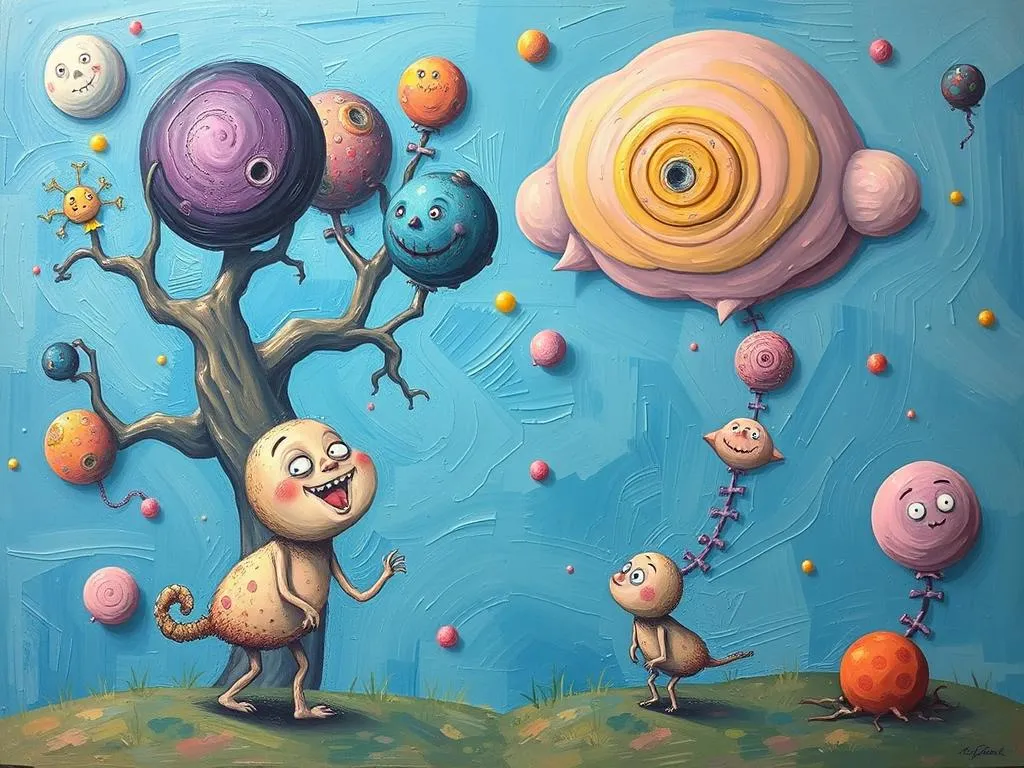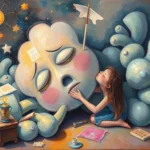
Have you ever woken up from a dream that left you scratching your head, wondering what on earth it all meant? Dreams can often feel like abstract puzzles crafted by our subconscious, filled with symbols, emotions, and narratives that seem to defy logic. It’s as if our minds are playing an intricate game of charades while we sleep, and the clues are woven into strange and fantastical scenarios. Understanding these dream riddles can not only provide insight into our inner thoughts but also guide us in our waking lives.
In this exploration, we’ll journey through the rich landscape of dream symbolism, delve into specific experiences that people commonly encounter in their dreams, and uncover pathways for personal growth. Think of this as a friendly chat with a wise companion who is eager to help you navigate the mysterious world of your dreams.
Dream Symbols: The Language of the Subconscious
Dreams often communicate through symbols, which are imbued with personal significance and universal meanings. Understanding these symbols can illuminate the underlying emotions and thoughts that shape our waking lives. For instance, water is a prevalent symbol in dreams, representing emotions and the unconscious mind. A tranquil lake might signify peace, while turbulent waves could indicate inner turmoil. Similarly, buildings can symbolize your sense of self or your aspirations; a crumbling structure may reflect insecurities, whereas a well-kept mansion could signify confidence and success.
Other common symbols include animals, which often represent instincts or fears. A fierce lion might embody your courage, while a snake could signify deceit or transformation. The presence of food in dreams often relates to nourishment, both physically and emotionally. What you consume or refuse in your dreams can indicate what you are seeking or avoiding in real life.
Cultural perspectives also play a role in dream symbolism. In many Indigenous cultures, dreams are seen as messages from ancestors or spiritual guides. The Japanese view dreams as prophetic, while Freudian psychology suggests they are manifestations of repressed desires. Understanding these various interpretations can enrich your analysis and give more depth to your dream experiences.
Dreamscapes: Tales from the Night
Let’s dive into some common dream scenarios that might feel oddly familiar. Perhaps you’ve found yourself in one of these experiences:
The Endless Fall
Many people experience dreams where they are falling. This sensation can be alarming and is often linked to feelings of insecurity or loss of control. Falling in a dream may reflect anxieties about a situation in your life where you feel unsteady, such as a new job or a relationship. The act of falling can also signify a fear of failure, urging you to confront those feelings and find stability.
Being Chased
In pursuit dreams, you often find yourself being chased by an unknown figure or creature. This recurring nightmare might symbolize avoidance—perhaps you’re running from a problem you need to face. The pursuer often represents an aspect of yourself that you’re unwilling to acknowledge. Instead of fleeing, consider what this figure represents in your life, and how confronting it could lead to resolution.
Naked in Public
Dreams of being naked in a public space can evoke a profound sense of vulnerability and embarrassment. This scenario typically relates to feelings of exposure or fear of judgment. It may indicate that you are grappling with your self-image or feeling unprepared for a social situation. Reflecting on your self-acceptance and the desire for authenticity can help you embrace these feelings.
Lost and Confused
Dreams where you find yourself lost, whether in a maze or an unfamiliar city, often symbolize confusion or uncertainty in your waking life. This can relate to life choices, relationships, or career paths. Such dreams encourage you to seek clarity and direction. If you often find yourself in these situations, take some time to assess your goals and priorities.
Flying High
Dreams of flying can be exhilarating and liberating, often symbolizing freedom and escape. They suggest a desire to rise above challenges or break free from constraints. However, if you struggle to maintain altitude or feel a sudden drop, it might reflect feelings of insecurity or fear about losing control over your life. Embrace the uplifting feeling of flying, and consider what aspects of your life allow you to soar.
Awakening Potential: Growth Through Dreams
Dreams aren’t just fleeting experiences; they can serve as powerful tools for personal growth. By engaging with the narratives and symbols presented in your dreams, you can unlock insights that may lead to transformative changes in your waking life. Here are some practical approaches to harness the wisdom of your dreams:
Dream Journaling
Keeping a dream journal is a fantastic way to capture the details of your dreams as soon as you wake up. Write down everything you remember, focusing on the symbols, emotions, and any recurring themes. Over time, patterns may emerge that can help you understand your subconscious better. Reflecting on these notes can offer clarity and guide your decision-making.
Mindful Reflection
After recording your dreams, take a moment to meditate on them. Ask yourself open-ended questions like, “What emotions did I feel?” or “What might this symbol represent in my life?” This reflective practice can deepen your understanding and help integrate the insights into your daily experiences.
Seek Guidance
Sometimes, discussing your dreams with a trusted friend or therapist can provide new perspectives. They may help you see connections you hadn’t considered or offer encouragement as you navigate feelings or situations that arise in your dreams.
Manifest Your Insights
Once you’ve identified themes or issues, consider setting intentions to address them in your waking life. For instance, if you dream about flying and feeling free, think about what steps you can take to incorporate more freedom into your daily routine. Intentions can make your dreams a catalyst for real change.
Embrace Creativity
Use your dreams as a springboard for creativity. Write a story, create art, or even compose music inspired by your dream experiences. Expressing your dreams in creative forms can not only provide an outlet for your emotions but also help you connect with your subconscious in a unique way.
As you explore the rich tapestry of your dreams, remember that each experience is a reflection of your unique journey. The symbols, scenarios, and emotions you encounter are not just random; they are part of your personal narrative, offering insights into your desires, fears, and aspirations. Embrace these dream riddles as opportunities for growth and self-discovery.
In closing, let’s reflect on the wisdom of our subconscious: Our dreams are not just a collection of bizarre images and narratives; they are a mirror to our inner selves, inviting us to explore the depths of our emotions and experiences. By decoding these dream riddles, we can embark on a journey of self-understanding, empowerment, and transformation. So, the next time you wake up from a peculiar dream, take a moment to savor the mystery and embrace the adventure it presents.







